I. Memorializing the Greatest Generation
Memorial Day is the day in which we remember, with solemn gratitude, all those who gave their lives in military service to our country. Elsewhere here at Breitbart News, others have recollected the fallen; as Abraham Lincoln said in eulogizing those who died at Gettysburg in 1863, “It is altogether fitting and proper that we should do this.”
Interestingly, Memorial Day was once known as Decoration Day. After all, it was, and is, the virtuous custom to decorate the graves of the war-dead. And in the name “Decoration Day,” we see something important for the sake of our civic life: the ability of each patriot to offer appropriate honors in his or her own way. That is, with flowers, cards, notes, or perhaps a bit of memorabilia.
Today, such personalized displays of devotion are particularly common at the Vietnam Veterans Memorial on the Mall in Washington, DC. Why? Most likely, because that war is relatively recent; plenty of people alive now still feel a close connection to Vietnam-era warriors.
Yet the passing of the years has meant that other American wars are rapidly receding from our personal memory. For instance, we might point to World War II. During that conflict, from 1941 to 1945, the population of the US was about 133 million. And yet in 2010, less than 5.5 million Americans were over the age of 85; that is, born in 1925 or earlier. Which is to say, the number of Americans today who could have had any adult participation in the war is small—and rapidly getting smaller, as old age takes its toll.
Yes, it’s painful to think that all the heroism of that era is no longer with us, at least not in a personal way. To be sure, there are many museum displays, history books, movies, and TV shows about World War II. And yet still, there’s nothing like the power of a personal reminiscence, as anyone who has ever sat at the knee of a revered elder knows full well. It will indeed, be a sad moment when the last voice from that era is stilled. So the least that each of can do is help to make sure that every one of those vital voices is archived in some form.
Moreover, perhaps on this Memorial Day we can recall more of the voices from World War II, reaching beyond the ranks of the heroes who died in uniform. That is, for the sake of the enlarging the historical record, we can recollect some of the memories about those who served, too, on the homefront, namely, in war production. If their personal risk and sacrifices were less than those who fought in battle, their contributions were nonetheless enormous: As Virgil has argued many times, America’s greatest comparative edge in World War II was its industrial production.
For instance, in a March 17 piece, “Donald Trump, Rosie the Riveter, and the Revival of American Economic Nationalism,” Virgil took note of President Trump’s speech, two days earlier, recalling the B-24 plant at Willow Run, Michigan. That was the plant that built 9,000 bombers that we used to flatten enemy targets.
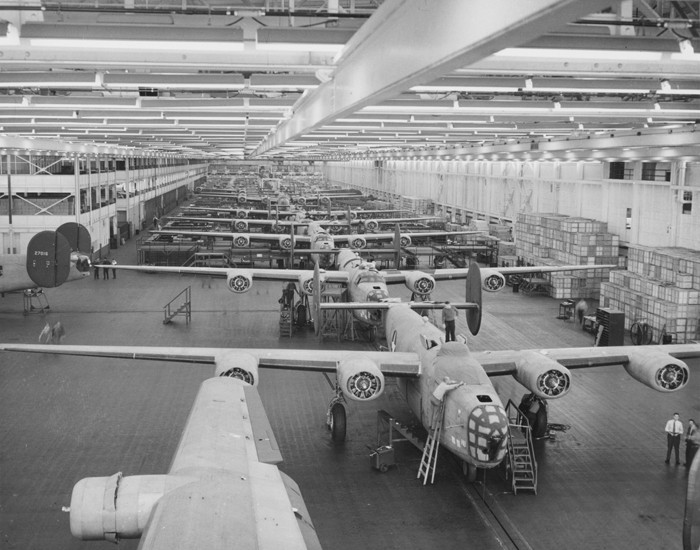
The B-24 assembly line, 1943, Willow Run Plant. (Source: The Henry Ford/Flickr)
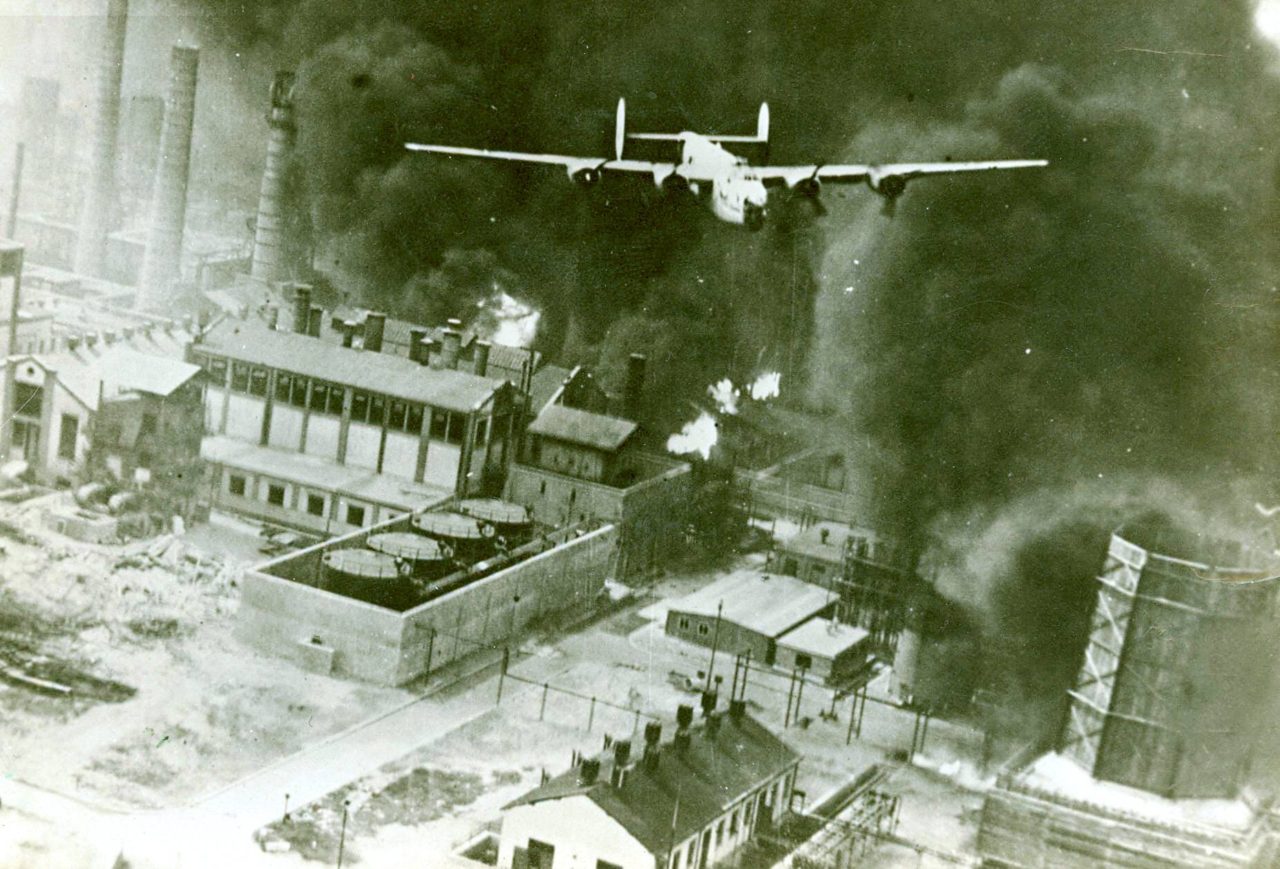
A B-24 flying over a burning oil refinery at Ploesti, Rumania, during Operation Tidal Wave, August 1, 1943. (Source: Wikimedia Commons)
And that piece brought forth an outpouring of WW2 memories from Breitbart readers, many of them recording what they had heard, over the years, from fathers, mothers, and other loved ones who lived, worked, and fought in that era. Virgil sifted through all the comments, more than 1800 of them; these left him inspired, informed, amused, and, okay, sometimes bemused.
For starters, Virgil enjoyed the comments specifically about a key theme of the article, which was war production in World War II; these postings were often from descendants of workers and veterans. Let’s take a look:
Reader “MadMen” said simply, “It makes me really miss my grandparents who both worked in those factories.” Meanwhile, reader “NHnative” reported that one family’s inheritance from WW2 includes, to this day, a devotion to sewing:
My grandmother was sewing parachutes . . . She moved on to sewing the uniforms. She’s still sewing daily at age 91 on her 1953 Singer. . . . All the girls in my family are accomplished seamstresses and it all started with those parachutes.
Reader “Last Ride” recalled a father who is, shall we say, particularly close to the B-24 Liberators made at Willow Run, Michigan, and other parts of the country:
My dad started his career in the USAF as a B-24 pilot just as they were being retired from service, and ended his career as a B-52 pilot. He loves the B-24 and moved to Ohio to be near the USAF Wright-Patterson museum to be able to visit one of the last ones around. He told my mom she should feel lucky that the plane could not say “I do” or she would have been replaced, I believe him.
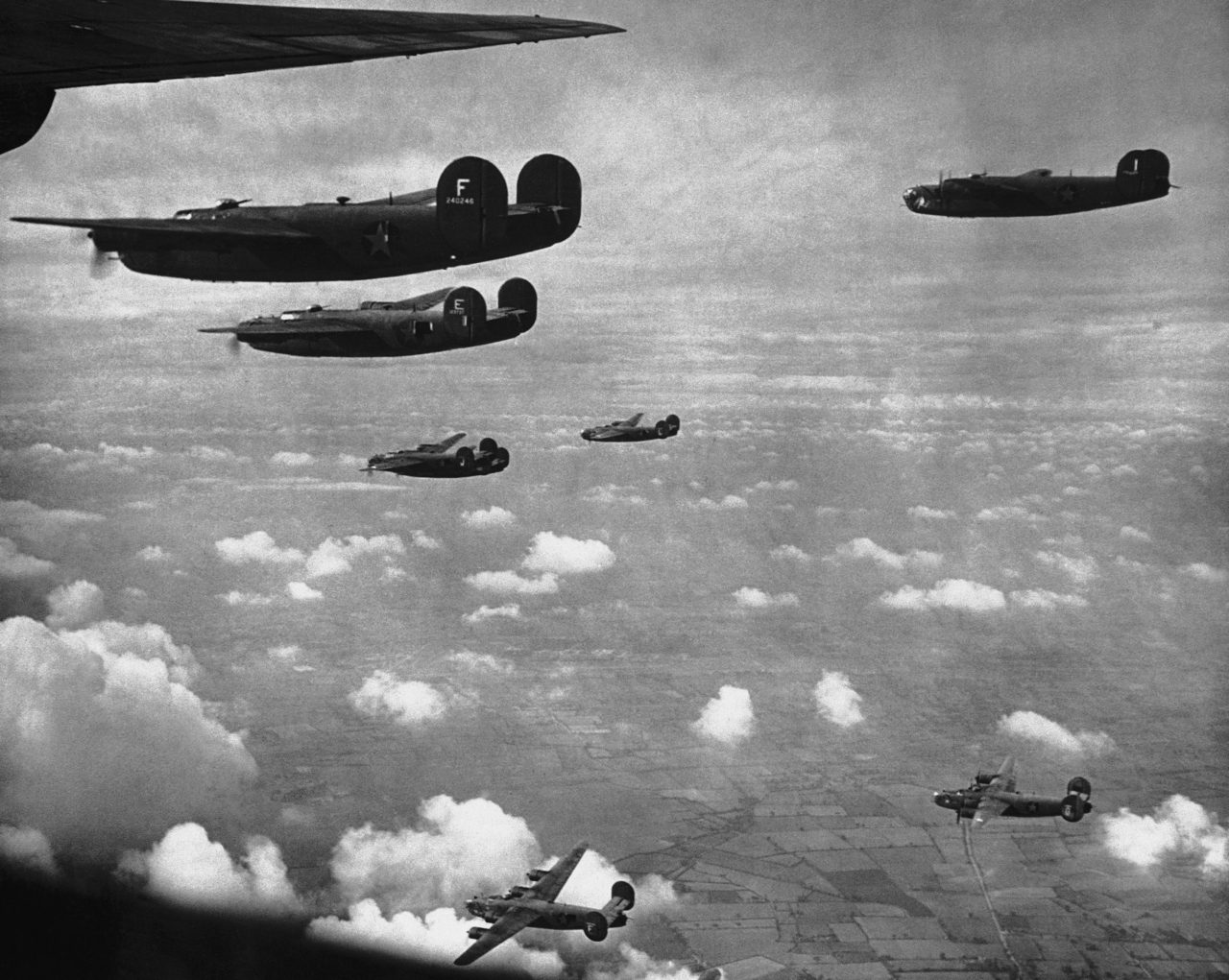
B-24 Liberator bombers of the U.S. 8th Air Force flying towards their targets in occupied Europe on Aug. 12, 1943. (AP Photo)
Meanwhile, the legendary Rosie the Riveter received much attention. Reader “Feet2Fire” reminded fellow commenters that there’s plenty to learn about Rosie from the website Diaryofarosie.
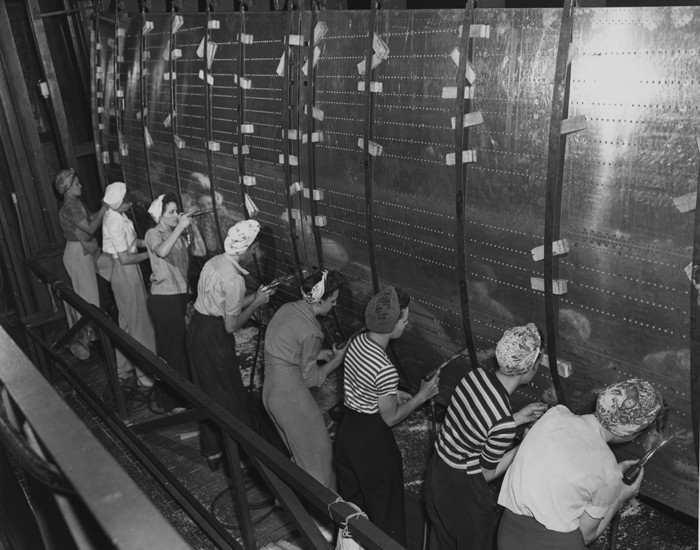
Women Riveting a B-24, 1944, Willow Run Plant (Source: The Henry Ford/Flickr)
Yet reader “53Skylark” raised a point of personal privilege—or, more precisely, Pittsburgh privilege—when he asserted:
The iconic Rosie the Riveter was based on a woman riveter employed by Westinghouse in Pittsburgh. In the original iconic picture she is wearing a Westinghouse employee badge. She did NOT originate at Willow Run. And, all of the steel for the planes, ships, tanks, bullets, etc. was made in Pittsburgh. The former steel capital of the world.
To which reader “Jonsen” replied:
Rosie became a symbol of more than one woman, though. She was a symbol for all women working at home to help the cause.
(As Virgil noted, while the actual Rosie the Riveter worked at Willow Run, the larger story of “Rosie” is complicated: The immortal “We Can Do It!” image does, indeed, come from Pittsburgh. Yet the great artist Norman Rockwell, too, added his own image of Rosie–and his model was from Vermont.)
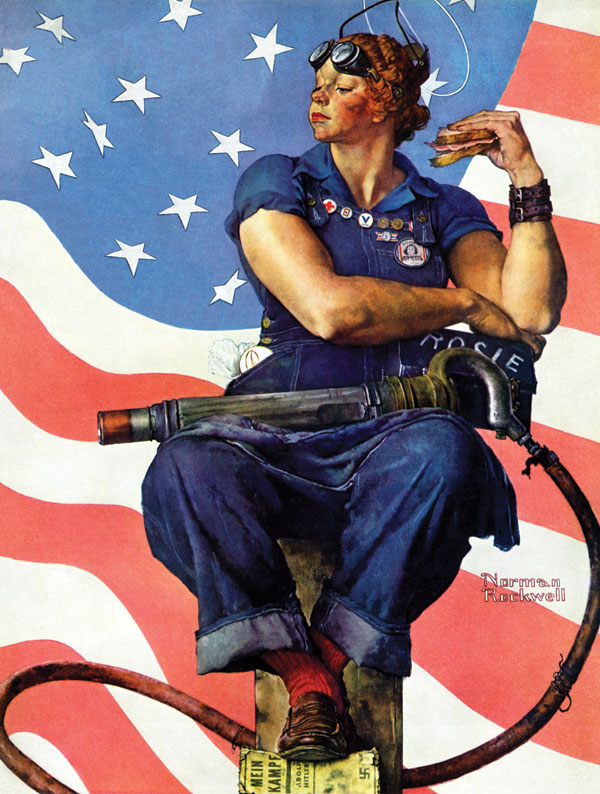
Norman Rockwell, Rosie the Riveter, Saturday Evening Post
Indeed, Rosie was more than just an individual; she was, and is, an archetype. Reader “TexanForever” recalled:
My mom was a “Rosie the riveter” at the North American plant in Grand Prairie, Texas. While I was in grade school in Dallas she was riveting together P-51’s. Being by nature very modest, she hated wearing slacks, but she did it for the war effort.
Or as reader “Sam Houston” put it:
This hits home to me as my Father and Uncle were WWII Vets. My Step Mom was a Rosie the Riveter on the B-24 Liberator, tail section, at Consolidated Air Force Plant #4 at Carswell Army Airfield in Fort Worth, Texas. She left the dairy farm in Yantis (East Texas) for the War Effort. . . . I am so proud of her and our Greatest Generation!
The actual Rosies, of course, are mostly departed by now, which makes commenters wish all the more to savor their memory. As reader “william couch” recalled, “In the early ’70’s, I worked with 2 Rosies. It was @ the plant in Rosecrans, CA.” And reader “Gary Eaker” offered a strong summary lesson:
Great image. Rosie the Riveter. Americans joining together to do what needs to be done to PROTECT AMERICA. We must join together.
Of course, Rosie will always live on in spirit. Indeed, as reader “Vypurr” explained, she holds up well: “Rosie had more Moxie and balls than any liberal crybaby Beta male today.”
Yes, the Rosies had spunk; reader “backhome1999” recalled this anecdote of female feistiness:
My Mom was one of those women. The story she tells, she was responsible for 1/2 of the airplane to connect everything to the pilot’s area, and she would finish in a few days while her male counterpart doing the same job on the other 1/2 of the airplane took up to 2 weeks finishing his side. She asked for a raise . . . she finally made as much as a man during that time, which was unheard of. But she did her job in 1/2 the time (and they knew it).
Other commenters compared and contrasted two very different women named Rosie, often adding observations about how things have changed, for the worse, since the 40s. One such was reader “Cindy”:
Now instead of Rosie the Riveter, we have the likes of Rosie O’Donnell and Amy Schumer making more for doing worse than nothing than most of us make in a lifetime. Long before the celebs showed their true colors, America made the yuge mistake of placing people who don’t contribute to our society in a meaningful way on a high pedestal so kids would dream of becoming THAT.
And speaking of popular culture, reader “chicodon” added:
Every young person should see this. Glenn Miller was the hottest musical act on the scene for young people in 1942. The entire country was patriotic, including Hollywood. It’s from before my time but it was America. . . . Can you picture ANY act today doing this? Rooting for the military?
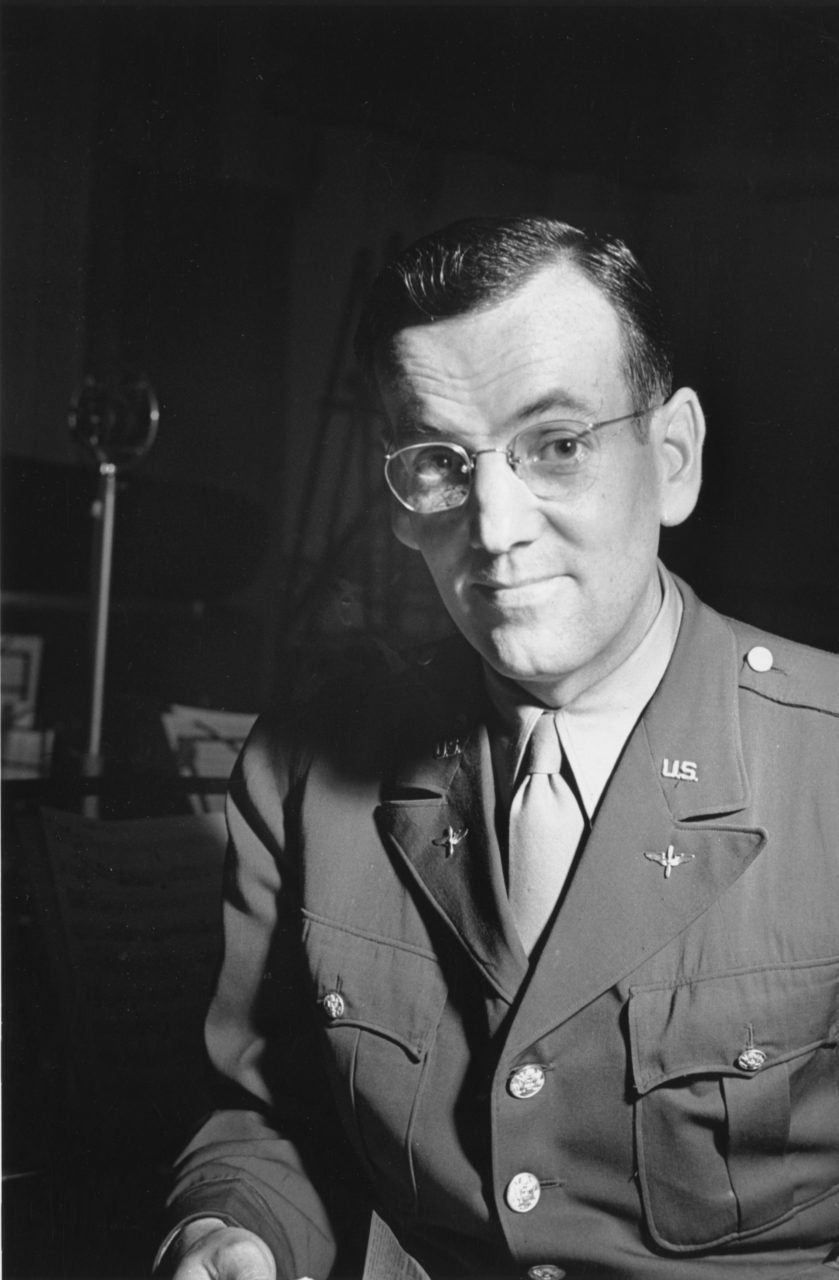
Glenn Miller (1904 – 1944) in military uniform. (Photo by D. Hess/Fox Photos/Getty Images)
Indeed, the lyrics to the Glenn Miller song “chicodon” links to, “People Like You And Me,” are stirring:
Say, get a load o’ those guys,
High in the skies,
Wingin’ to victory;
Up and at ’em in the fight for
People like you and me!Hey, get a load o’ those gobs,
Doin’ their jobs,
Keepin’ the sea lanes free;
Just to make the future bright for
People like you and me!
“Gobs,” we might note, was affectionate slang for “seamen.” At the same time, in that song, the vital work on the homefront was also not forgotten:
We’ll have to roll up our sleeves,
Tighten our belts,
But through the dark we’ll see
The lady with the liberty light for
People like you and you and you,
And people like me,
People like you and me!
Miller, we might recall, joined the US Army during WW2 at the peak of his career—and at age 38. He died on December 15, 1944, when his airplane crashed into the English Channel; he had been preparing the next leg of his famed orchestra’s morale-boosting tour for the troops.
Of course, Miller’s sacrifice was common; many celebrities joined the armed services, and many more pitched in—and more than a few died.
For his part, reader “Euclid” took note of the visual elements of Virgil’s article, for which the author can claim no credit:
LOOK AT THOSE PHOTOS! Black and white American men and women all working together in harmony. . . . Look at us now! The most divided ever among race, gender, class, age, etc!
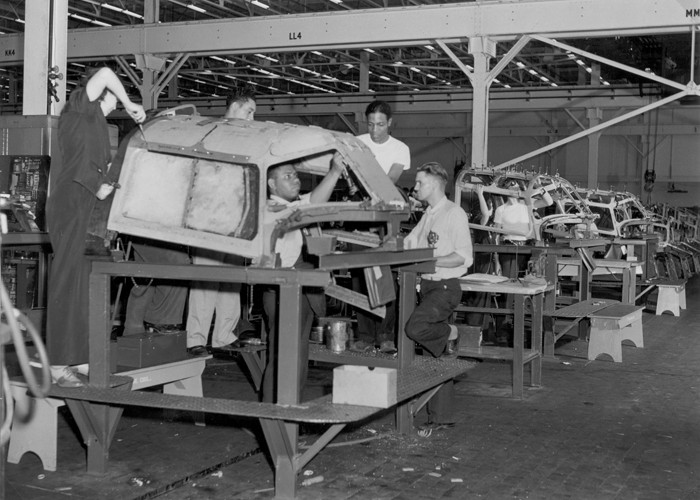
Men assembling the cockpit of a B-24, 1942, Willow Run Bomber Plant (Source: The Henry Ford/Flickr)
Yes, everyone found a way to pitch in back then; as Trump likes to say, the blood of patriots is all the same color.
Without a doubt, we were mostly inspired by patriotism back then, and yet for some, the production effort was personal. Here’s how reader “Katherine” recalled the war work of her grandfather; please note the family-values kicker at the end:
My grandfather was a tool and die maker for Ford, and was asked to be a foreman at the Pratt and Whitney plant in Highland Park, Michigan, which built the engines for the B-24. He didn’t want to be a foreman, but he did it because one of his three sons who were in the service was a B-24 bomber pilot, and he wanted to be sure his son had good engines to fly.

B-24 Liberator Bombers in Flight, 1943 (Source: The Henry Ford/Flickr)
So it’s little wonder that even today, many remember the good work that was done. For instance, reader “Havegunwilltravel” wrote:
My father was a B-24 pilot in WW 2. He flew from England over Germany and he often told me that it was his airplane that brought him back every time. The B-24 was hard to fly, no pressurization but she was tough not like what we have today, “MADE IN CHINA” crap. I would like to thank all the people who worked at Willow Run who took pride in their work and built one of the greatest airplanes in the world.
Another commenter, reader “Jake Manchester,” added:
I love stories about America’s exceptionalism. Imagine building one B-24 every hour. Now that, my friends, is American exceptionalism.
Yet in those days, as reader “sally forth” recalled, just about everyone was exceptional:
It wasn’t just Rosie, it was everyday citizens with victory gardens, & scrap metal drives. Those that sold war bonds & those that bought war bonds. It was rationing of food & gas. Farmers & entire families produced more food. Every PATRIOTIC American was somehow involved to win the big one & bring the boys home.
And yes, Virgil will say it again, a great commander-in-chief led us to victory. As reader “backhome1999” remembers:
My Mom worked in a factory building planes for the WWII effort, and the photo of FDR reminds me of her story about FDR driving through the plant one day on her way into work and waved at her. She helped build B-17’s, Douglas plant, Long Beach, Calif.
Virgil recognizes that not every Breitbart commenter, including reader “Crazycatkid,” is a fan of Franklin D. Roosevelt. And yet we all might recall that his fellow Americans thought so highly of FDR that they elected him to the White House four times; indeed, each of his presidential victories was a landslide. Moreover, the fact that his image has been on the US dime for the last 70 years tells us something about his enduring popularity; even two Republicans, Nancy and Ronald Reagan, revered him.
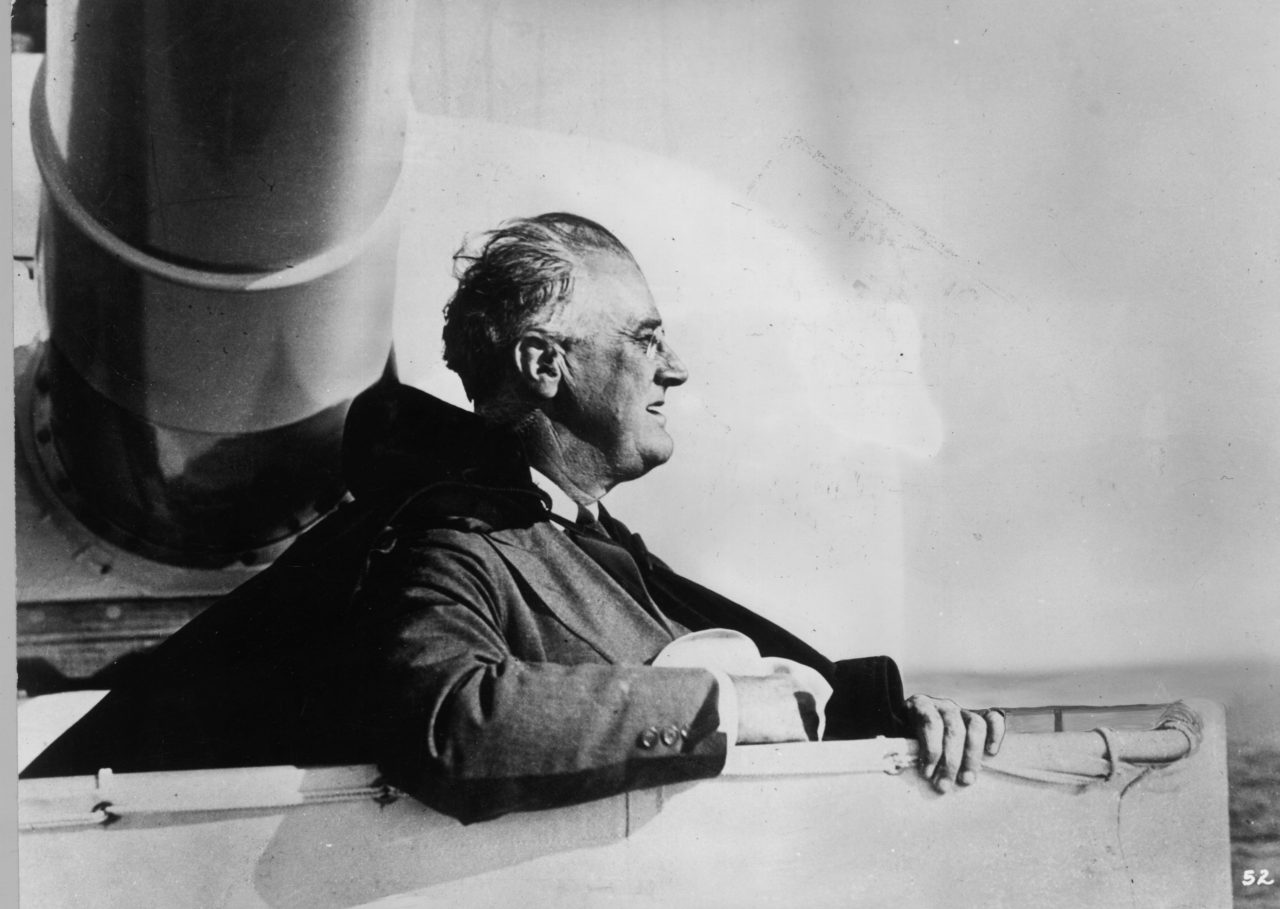
President Franklin Delano Roosevelt on board an American warship, circa 1935. (Photo by Keystone/Getty Images
Yet in addition to the warm glow of nostalgia from those days, there’s also the chill pang of loss. Reader “Texan Forever” wrote:
We were a nation united. . . .During this period my favorite cousin, T.J. Morrow, was a left waist gunner on a B-24. In 1943 while over Germany he was killed instantly by flak. The crippled bomber managed to limp to Belgium where the remaining crew bailed out. T.J.’s body went down with the plane and was buried by a Belgian farmer. His remains were later brought back to America.
Indeed, we never forget those who gave all. And if personal memories are now flickering out, well, the rest of us will have to step up our game and keep the remembrance going. As reader “HandsomeRogue” added, “It’s our American history. It’s a legacy our Parents/Grand-Parents lived and we have—largely—failed to share.”
Those who hear the call to remember our history should, of course, visit grave sites and battlefields. Yet in addition, there are other ways to gain perspective. As reader “WTP1776” noted, “Every year they fly the WWII planes right over my house . . . I love hearing the dishes shake in the cupboard . . . they look so swell.”
In fact, learning about the winged marvels that brought victory in WW2 can be fun, as well as informative. As another reader posted:
If you EVER have the opportunity to ride in a WWII warbird and have the money, do it. It’s an experience of a lifetime. Not just for the flight experience itself, but for at least getting a hint first hand what those young kids crewing them must have gone through in combat conditions.
II. The Task Ahead
The point of Virgil’s article was not only to take note of President Trump’s celebration of Rosie and the Greatest Generation, but also to observe that the outlines of an American manufacturing revival—which is to say, a revival of American greatness, including military greatness—can now be seen. And plenty of readers see it, too: Virgil lost track of the number of “MAGAs” scattered through the comments.
Yet some Michiganders had a more immediate reaction. For instance, one Michigan reader wrote, “I have seen President Trump mention us in Michigan more (in a good way) in the past 3 months, than my entire life (since 1960).”
Yet at the same time, there are lessons for all Americans to learn. For example, one reader connected the success of the national effort during WW2 to earlier American team efforts:
This is truly the American way. It has always been our way. It is only a short distance in time and space from the barn-raising in farm country to the factory at Willow Run. From that barn-raising to Willow Run to today we are Americans who work and succeed together.
As reader “Vypurr” observed, “Nationalism is what kept America alive in WWII.” And reader “Tiger Kitten” turned that point into a larger sentiment:
Nationalism is a good thing, it keeps cultures intact, countries strong, and morale high, whereas globalism does nothing but destroy cultures. Without borders you not only have no country, you have no culture, either.
Meanwhile, reader “FLGibsonJr” added valuable historical perspective, linking Trump’s ideas on trade today with the American tradition—as described by Virgil—of Alexander Hamilton and Henry Clay:
America was famous around the world for its Protectionism. In fact it was Protectionist Tariffs that paid for essentially our entire government including all of our military. Furthermore, it was Bismarck who looked at the American System of high tariffs and the British System . . . of free trade and chose the American System of high tariffs and then went about building one of the great economic powers in the world.
“FLGibsonJr” continued by urging a fellow commenter not to be seduced by “globalist corporate propaganda.” The free-trade policies stemming from such propaganda, he added, might enrich companies, but they will be “devastating for countries like the United States.”
Meanwhile, reader “American Worker’s Warrior” put the matter in even starker terms:
We couldn’t win a war like WW2 today, not after the uniparty’s NAFTA decimated our industrial base, and now we have to rely on China and Asia to make the microchips for all our smart missiles and tech.
Others added similarly-minded policy prescriptions, connecting past to present. One such was reader “newsies2”:
The Willow Run Bomber Plant was as example of what our great Country was capable of doing, when the need arose. This plant went up in the space of less than a year, and was capable of producing an airplane that helped win the war. One has to admit that it was a great success. In my thinking, the article, as it mentioned, is about SELF-SUFFICIENCY! . . . Trump is talking about our People working together to be strong and self sufficient once more.
Today, some are already doing their part. For instance, reader “JRG” has a personalized trade policy:
During WW2 my mom worked in a factory making piston rings while my dad was in the Pacific doing what Marines do. I go out of my way to purchase products that are made in the USA even though I know it will cost me more.
Still, many commenters made the point that automation will change the factory of the future and factory employment in the future. And this is undoubtedly true. Indeed, some, such as reader “greg,” went out of their way to make the point, sharply, at Virgil’s expense:
This article is ridiculous. It would have you believe that there is some chance that there will be manufacturing jobs coming back to the US.
To which reader “Jonsen” riposted, “It’s about the can do spirit.” “Jonsen” added, quoting Virgil, “before WWII ‘we had the resources in place.’” And those at-the-ready resources, as Virgil noted, included a quality workforce.
As reader “Kris Johnson” wrote of those we’re-all-in-this-together days:
Tears fill my eyes at the thought of the America of my grandfather. . . .To imagine a time when management was proud to provide good people with good jobs. Good American companies built excellent American products that worked and lasted beyond expectation.
Indeed, as reader “AngelHorseMomMD223” pointed out, even today, labor is still important:
If automation was THE issue in regards to employment, they’d be importing machines, not highly skilled H1B visa workers or unskilled laborers.
Indeed, the issue of trade came up often in the comments. For instance, reader “MechMan” wrote, “We must be careful not to become anti-free trade. Free trade is a good thing.” To which reader “Mbekos” responded, “There is no free trade, none. Japan, Korea, Taiwan, China, Germany, all of them had non-tariff ways to win the trade war with US.” And reader “GSR” added, “Free trade can benefit a company, but too much of it can destroy a nation.”
Meanwhile, reader “GahD of Socialism,” the name notwithstanding, made a powerful point about capitalism: “When a country has a manufacturing-based economy, it thrives.”
Yet at the same time, reader “Franco” added a point that was widely understood in the 40s, and less widely understood today: “Can’t have a manufacturing sector without strong consumption and demand.” That is, people need the money in their pockets to buy the things that are being made; too much concentration of wealth at the top means too little demand for products—and so the economy stalls.
Thus reader “Tyler’s” point on the distribution of wealth, then vs. now, deserves to be taken seriously: “During those years CEO and leadership pay was 80 times the median worker. Now it’s 900 times the median worker.”
In addition, reader “Gregory Brittain” added another good point about the value of widespread prosperity:
In addition to the economic effects, the social effects of good jobs are at least as important. Good jobs leads to more marriage, two-parent families, more children, more stable communities, less crime and more social harmony as a bigger piece of pie is available to all who work for it.
Another reader took note of a line from Virgil’s article, describing corporate culture back then: “A well-paid employee was loyal to a company, and the company, in turn, was loyal to the employee.” Then the reader added a crucial observation about all-too-common corporate practices today:
THIS is what has fallen by the wayside with the infection of the globalist mindset. Billionaires see themselves as countries unto themselves, and have no loyalties to anyone or anything else.
For his part, reader “Lew Ross” was even more blunt:
I wish there was some way to prosecute politicians who purposely hurt American wages [by] assisting globalists in cheap labor and higher profits abroad and south of the border. For almost two decades average household earnings have been stagnant for the working-to-lower-middle-class, and nobody has paid any price for betraying the nation.
Not surprisingly, President Trump figured in many of the comments. Reader “Stella S” posted, “I listened to that speech. It was heartfelt from an American President to American workers.” Or as reader “NYPATRIOT” declared, “Make America Great Again, and the manufacturing powerhouse of the world!” And reader “Buckeye Ken” wrote:
President Trump bringing the globalists to heel is a good thing. Lord knows that he is not opposed to anyone making money, but the overall good of the nation must be considered first.
To be sure, Trump had critics, too, among the commenters. One such was reader “Stever Collette,” who jibed: “ALL of Dishonest Donald’s products are made overseas. His hotels and clubs continue to use foreign workers on temp visas.”
Okay, in American everyone can have his or her own opinion, and more than a few of those opinions seem to end up in the Breitbart comments section.
And reader “ConfidentSpaceman” put all these diverse options into a useful context, saying of this site,“It has become the modern equivalent of the public square.”
And so maybe that’s a good place to stop. WW2 was fought, in part, for freedom, and so those who fought—on the battlefront and on the homefront—would be gratified to know that freedom is still a cherished value.
Finally, Virgil is grateful to the following readers for their nice comments: “aha!,” “Alexa,” “AngelHorseMomMD223,” “Brick Wilson,” “DesertSun59,” “DJTWILLWIN,” “HandsomeRogue,” “Jake Manchester,” “larry king,” “Lizzy,” “MadMen,” “Marianne,” “NHnative,” “NK210,” “Sam Houston,” “Texan Forever,” and “Tiger184.”
And thanks to all the other commenters, too, even those who were not so nice; Virgil learns from all of them.
And more to the point, thanks to those who shared their personal histories, the overall canon of American history has thus been enriched.
Listen to Breitbart’s Rebecca Mansour discuss this article on Breitbart News Daily on SiriusXM:
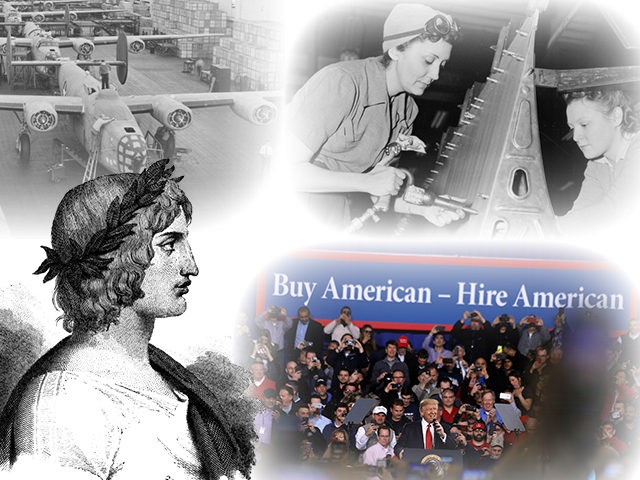
COMMENTS
Please let us know if you're having issues with commenting.